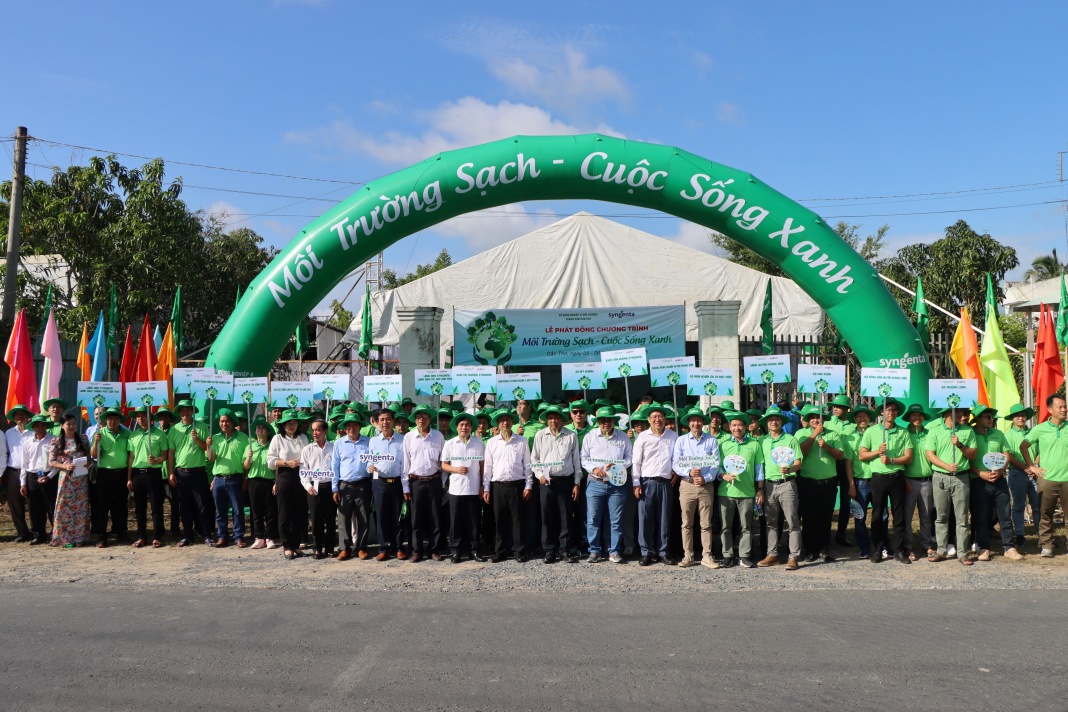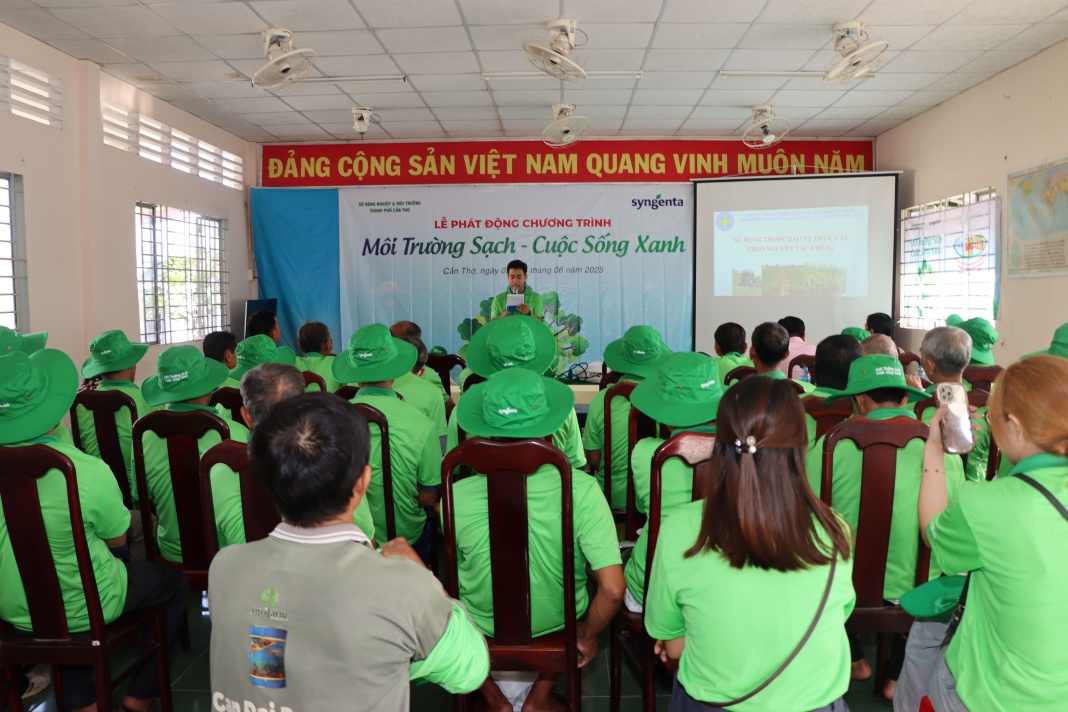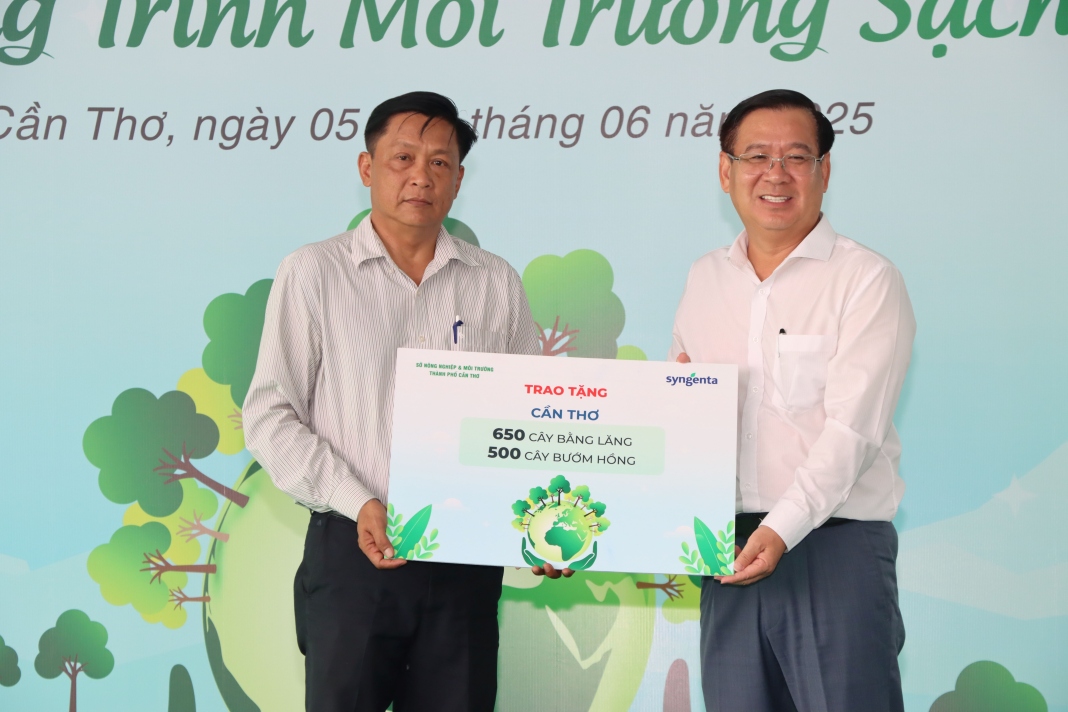In the lush heart of Vietnam’s Mekong Delta, a quiet but powerful environmental revolution is taking place—led by farmers, local officials, and an agricultural company with a long-standing commitment to sustainability.
For the 11th year in a row, Syngenta Vietnam’s flagship environmental initiative, “Clean Environment – Green Life,” has swept across rural districts, transforming communities and landscapes with pesticide packaging collected being exchanged for trees planted.
The 2025 campaign, carried out in partnership with the Departments of Agriculture and Environment of Can Tho City and Soc Trang Province, has proven to be impactful. With more than 8.2 tons of used pesticide packaging collected and 1,850 trees planted along rural roads in Phong Dien and Long Phu districts, the initiative is building momentum—and winning hearts.
A decade of grassroots green advocacy
Launched in 2015, “Clean Environment – Green Life” began with a simple mission: to raise awareness about the environmental hazards of improperly discarded pesticide packaging and to promote safer agricultural practices. Over the years, it has evolved into a deeply rooted movement, combining environmental education, community engagement, and corporate responsibility.

In its latest edition, Syngenta Vietnam organized six pesticide packaging collection points across the two provinces. To galvanize participation, the campaign relied on local radio stations, banners, and community outreach—tools that proved both low-tech and highly effective.
“The turnout this year was above expectations,” said a campaign coordinator in Can Tho. “People brought in used packaging not just to get practical gifts, but because they now understand the impact these materials have on the environment.”
Collected waste was then transferred to licensed contractors for safe disposal, ensuring it met Syngenta Group’s stringent global standards. In return, the company donated trees to be planted along village roads—creating a living symbol of environmental renewal.
Trees for tomorrow, training for today
In Can Tho’s Phong Dien District, more than six tons of collected pesticide packaging were exchanged for 1,150 trees, including vibrant crape myrtles and elegant pink butterfly trees, now lining the district’s main roads. In Soc Trang’s Long Phu District, another 1.9 tons of waste led to the planting of Hopea odorata (ironwood) trees and more crape myrtles, restoring green beauty to rural roadsides.
But the campaign offers more than tree saplings. It delivers knowledge—arguably the most sustainable resource of all.
Farmers participated in training sessions centered on the “Four Rights” (right product, right dosage, right timing, and right method) and the “Five Golden Rules” for pesticide use. These sessions also emphasized proper use of protective equipment and environmentally sound disposal of chemical containers.

Luu Van Dinh, a farmer from Can Tho’s Thanh Phu Commune, shared how the program has changed his habits. “I used to toss empty containers wherever I finished spraying,” he admitted. “Now, I collect and return them. My family’s health is better, our fields are cleaner, and I’m proud to do my part.”
Local governments join the green push
Much of the campaign’s success is owed to its strong alignment with local and national development goals—especially Vietnam’s Strategy for Sustainable Agricultural and Rural Development to 2030. Local authorities in Can Tho and Soc Trang have embraced the program not just as a seasonal event but as a model for sustainable rural progress.
Tran Thai Nghiem, deputy director of the Can Tho Department of Agriculture and Environment, called the initiative “a shining example of successful collaboration between business, government, and the public.” He noted that community-wide involvement was essential to achieving green, beautiful rural development.
Nguyen Thi Thuy Nhi, his counterpart in Soc Trang, said: “This program doesn’t just teach people how to protect the environment—it gives them the tools and motivation to do so. Our roads are cleaner, our trees are growing, and our residents are more engaged than ever.”
From passive observers to active stewards
What sets “Clean Environment – Green Life” apart from many environmental campaigns is the level of local ownership it fosters. Community members no longer wait for instructions—they take initiative.
“In the past, people didn’t really think about the environmental impact of farming waste,” said a campaign organizer in Long Phu. “Now, they remind each other to save containers, bring them in, and join the tree-planting teams.”
Syngenta employees also contribute more than logistics. They roll up their sleeves alongside residents—planting trees, picking up litter, and demonstrating that environmental protection begins with action, not intention.
Tran Thanh Vu, general director of Syngenta Vietnam, said this boots-on-the-ground participation reflects the company’s long-term commitment. “As a company deeply rooted in Vietnamese agriculture, Syngenta believes environmental protection is inseparable from our mission. The collective effort behind ‘Clean Environment – Green Life’ has brought lasting, positive change—and that’s something we’re proud to continue supporting.”
A model worth replicating
Syngenta’s partnership with local agricultural departments—formally part of a cooperation framework with Plant Production & Protection Department under the Ministry of Agriculture and Environment for the 2021–2025 period—demonstrates the potential of public-private collaboration in addressing rural environmental challenges.
Earlier this year, a similar event in Thai Binh Province saw Syngenta working with the local Sub-Department of Crop Production and Animal Husbandry to plant 430 trees along a rural road in Dong Cuong Commune. These activities highlight how adaptable and replicable the model is across Vietnam’s diverse agricultural landscapes.
With over three decades of presence in Vietnam, Syngenta continues to introduce cutting-edge crop protection and seed technologies to millions of farmers. But as this campaign shows, technology alone isn’t enough—true progress stems from education, partnership, and trust.
“Clean Environment – Green Life” may not be a national headline every day, but in Vietnam’s rural heartlands, it is making a quiet, lasting difference. Each tree planted, each container returned, each lesson learned is a step toward a more sustainable agricultural future.
In the words of one local official, “Green development isn’t about slogans—it’s about shared responsibility. When farmers, businesses, and governments work together, even small actions create deep roots.”
And in the Mekong Delta, those roots are already beginning to bloom.









